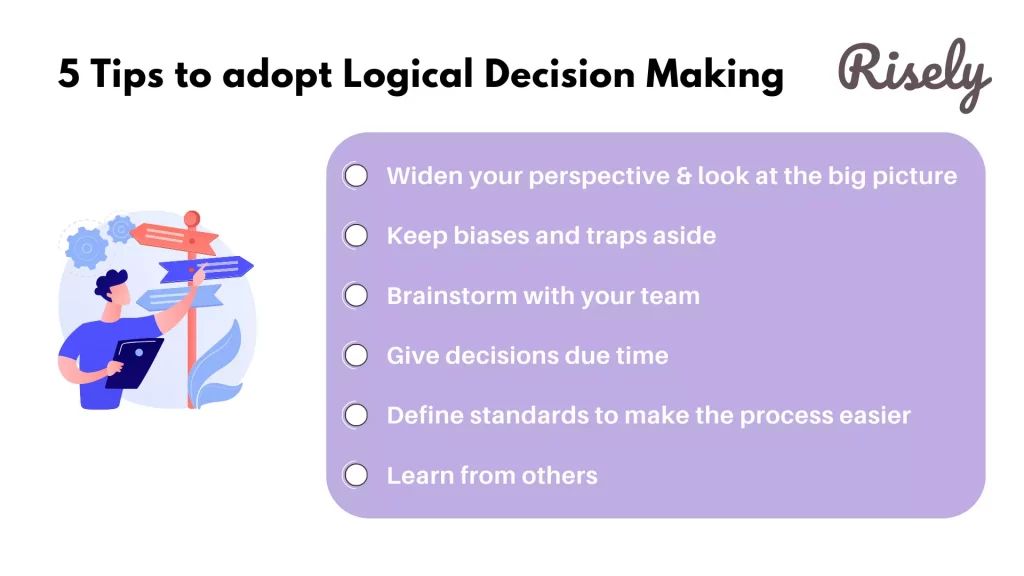What Is Logical Decision-Making At Work: 6 Tips to Adopt It
Decision-making is a difficult task that requires logical thinking. However, without decision-making, your team cannot move forward. Decision-making is a critical function in teams. But if decision-making is left to the individuals, the chances of errors and failure are high, and strategic goals are not met. A manager needs to beat these odds every day. Logical decision-making can help you make sound decisions and achieve goals in your team. It enables you to prioritize actions and choose the best course with the least risk. This blog will cover what logical decision-making is and why it’s essential for a team to have logical decision-making processes in place. The blog will also share ways to implement logical decision-making in your team to improve decision-making outcomes and reduce risk.What is logical decision-making?
Logical decision-making is a process of weighing facts and figures to arrive at a reasoned outcome. It is a step-wise process that reduces the probability of errors in the team’s and manager’s decision-making. The first step is the decision-making stage. Here, you must know the factors that can influence your decision-making. It includes things like your personal preferences, experience, and knowledge base. You will also have to consider the options before making your final decision. The evaluation stage follows this. In this step, you must carefully evaluate each factor and decide based on the most credible and relevant information. The third step is the planning stage. Here, the manager will have to outline critical decisions or outcomes and analyze their impact on the decision-making process and others involved. The fourth step is the implementation stage. In this step, you will need to think through how you will implement your decision-making regarding action, resources, and timeline. Lastly, in the evaluation stage, you need to critically reevaluate your decision-making process and revisit any essential decisions or outcomes that are not working out as expected. By following these steps strictly, you can create rational decisions with great accuracy and precision. So let’s move forward and understand the best practices for managers to make more logical decisions with their teams.How do managers use logical decision-making at work?
A manager might use logical decision-making to determine which candidate to hire for a job opening. They could start by establishing criteria a candidate should meet, such as qualifications and experience. Then, they could gather information about each candidate through resumes, interviews, and reference checks. Finally, they would weigh the pros and cons of each candidate based on the established criteria and make a logical decision on which candidate to offer the job to.Why do you need logical decision-making?
Many people think they make decisions primarily through logic, but our brains are designed to make emotional decisions due to the time constraints of making quick decisions. Therefore, it is crucial to process facts and make logical decisions effectively. However, making decisions purely through logic can lead to feeling dissatisfied with the decision later on, as decisions based on only reason may not be as accurate as desired. Therefore, when making a decision, it is critical to combine logical thinking with other strategies, such as intuition and emotions, to achieve the best possible outcome. By balancing all three elements of decision-making, you can ensure that you are making the best decision possible in a given situation. Read more: 12 Decision Making Types Smart Managers UseOther Interesting Reads
How to adopt logical decision-making with your team? 6 Tips
It is essential to use logical decision-making with your team. Here are some tips to help you do so.
Look at the big picture
Looking at the big picture is a critical step to making logical decisions. Rational decision-making involves considering all available information, including knowledge, expectations, and beliefs. When making decisions, it is crucial to consider the available information and factors. It includes intuition and gut instinct, which are unreliable unless the person has extensive experience in the area. Additionally, complex decisions should be broken down into smaller pieces and analyzed from different angles so that a comprehensive decision can be made. It is also vital to consider the potential consequences of a decision before making it. By considering all these factors, managers can make logical decisions confidently for their teams.Keep biases and traps aside
One of the key challenges in making decisions is overcoming biases and traps. To make good decisions, it’s important to base them on logic instead of solely on intuition and heuristics. This can mean avoiding overthinking and second-guessing when making a decision. It can be especially problematic if a manager is inexperienced in the domain. So, it is best to use logical processes to make decisions if this is possible. For instance, when you have to pick the strategy for your team, don’t pick what seems best initially. Instead, do thorough research and detailed planning before making a final decision. This way, you ensure that all the relevant information is available and that there is enough time to evaluate the options and reach a logical conclusion carefully. By making good decisions based on logic instead of intuition, you can avoid being swayed by biases and traps and ensure that your actions are driven by sound reasoning rather than just emotion. Read more: How To Overcome The 10 Most Common Manager Biases At Work?Brainstorm with your team
Another critical skill for making good decisions is collaborating with your team. It can be beneficial when it comes to complex decisions. By brainstorming together, you can gather different perspectives on the issue and reach a more comprehensive decision. Additionally, by having a discussion early on in the decision-making process, potential problems can be spotted and prevented from arising later. Furthermore, if everyone involved in the decision agrees with it, it’s likely to be successful; this helps avoid gridlock and conflict, which often lead to bad outcomes. Decision-making models can help decision-making teams make better decisions. They can identify the decision-making criteria, such the decision-making criteria, and weigh various decision-making options. These models typically involve decision-making techniques such as critical thinking, quantitative analysis, and synthesis. They also help decision-making teams identify the decision-making criteria, critically weigh various decision-making options based on those criteria, and reach a conclusion about the best decision. This can help improve decision-making quality and reduce decision-making costs. Read more: How mental models help in effective decision-making as a manager?Give decisions due time
To make sound decisions, giving them enough time to be analyzed and assessed is vital. When making decisions, it is crucial to set timelines for the decision-making process. It will help ensure that all relevant stakeholders are informed and that the decision is sound. In addition, making decisions in a rush can lead to poor judgment and flawed decision-making. Instead, it is best to take your time and make sure that you make a decision that is in the best interest of your organization. Giving decisions due time ensures you make sound decisions that will benefit your team long term.Define standards to make the process easier
When making decisions, it is important to have standards in place. Standards help decision-making teams make fair and accurate judgments about the options available. They can also help decision-makers filter and focus on critical information while avoiding irrelevant data. Standards can be anything from guidelines to specific criteria that need to be met for a decision to be considered valid. By defining standards, decision-making teams can improve the quality of their choices by ensuring that all relevant factors are considered.Learn from experiences
By learning from experiences, we can use intuition and deep experiential learning to make rapid and accurate decisions. When deciding in the workplace, logical thinking can help process facts and implement reasonable solutions rather than acting solely on their emotions. Both intuition and logical thinking help make decisions, but instinct tends to be much faster. In decision-making, team members should weigh the available evidence to make reasoned, logical decisions that benefit the workplace. Check out “How to create a Positive Workplace Environment? 8 Proven Hacks“ By learning from our experiences at work and applying logic when making decisions, we can improve our decision-making skills and lead to better outcomes for the team. It helps us all become more effective and efficient decision-makers, which is vital for the success of any business.Balancing emotions and logic in decisions
Decisions can be made using both logic and emotions. Whether decisions are being made based on logic or emotions depends on the situation. The popular psychological research website Psychology Today, suggests that most decisions are driven by emotions, even though people often think they are made through logic. Even though emotional decision-making is common, other factors should be considered to ensure optimal decision-making. Besides, it is important to recognize whether decisions are made based on logic or emotions to make the most informed decision. When making a decision, it is essential to consider logic and emotions to make the best possible choice for long-term satisfaction. Therefore, it is vital to balance logic and emotion when making important decisions. Read more: 5 Ways Emotional Intelligence in Communication Helps You at WorkConclusion
Getting logical decision-making is like learning to walk. It would help if you practiced it repeatedly and did not skip the steps. That is why it has been said that decision-making is a skill that develops over time. It takes practice and determination to change the way you make decisions. However, plenty of resources are available to help you learn logical decision-making. One such aid would be attending seminars or conferences on the subject. Other options include reading books on the subject, attending training sessions, or consulting with a professional decision-making coach. Besides helping you understand logical decision-making and making better decisions, these resources will also help you learn more about decision-making processes in general and how they work in teams.Do you balance logic and emotions in your decisions?
Evaluate your decision-making skills with a quick self-assessment for team managers
Other Related Blogs
10 Signs You’re Struggling with Analysis Paralysis at Work
10 Signs You’re Struggling with Analysis Paralysis at Work The smart fox declares, “I have a hundred ways to escape when trouble approaches. You have only one.” As the dogs…
Evidence Based Decision Making: 4 Proven Hacks For Managers
Evidence Based Decision Making: 4 Proven Hacks For Managers In this blog, we will explore the concept of evidence-based decision-making and provide seven proven hacks for managers to implement evidence-based…
6 Best Books On Decision Making For Managers
6 Best Books On Decision Making For Managers Effective decision-making is crucial for managers to navigate the complexities of their roles. You are responsible for making important choices that can…
Best Decision Coaches To Guide You Toward Great Choices
Best Decision Coaches To Guide You Toward Great Choices Effective decision-making is more crucial than ever in today’s rapidly evolving business landscape. Entrepreneurs, leaders, and professionals alike are constantly faced…


